Best Chatbot Platforms for Industry-Specific Needs

In today’s competitive landscape, an enterprise chatbot solution is no longer a luxury—it’s a necessity. Industries like retail, healthcare, and finance are leveraging tailored AI chatbot platforms to streamline operations and elevate customer engagement. These solutions not only reduce overhead costs by over 30% but also improve employee productivity by automating repetitive tasks. For example, chatbots handle inquiries 24/7, delivering accurate responses in seconds and enhancing customer satisfaction.
Sobot, a leader in intelligent contact center solutions, exemplifies this innovation. Its AI chatbot empowers businesses to boost operational efficiency while increasing conversions by up to 20%. As industries evolve, adopting advanced chatbot technology becomes essential for driving growth and staying competitive.
Understanding Enterprise Chatbot Solutions
What Are Enterprise Chatbot Solutions
An enterprise chatbot solution is a sophisticated AI-powered tool designed to automate and enhance customer interactions across various industries. Unlike basic chatbots, these solutions cater to large-scale operations, offering advanced features like natural language processing (NLP), omnichannel support, and seamless integration with existing systems. They are tailored to meet the unique demands of industries such as retail, healthcare, and finance, ensuring efficient and personalized customer engagement.
For example, Bank of America's AI chatbot, Erica, has surpassed one billion client interactions, showcasing the scalability and effectiveness of enterprise conversational AI. Similarly, Northwell Health's AI-driven pregnancy chatbot demonstrates how these solutions address critical needs in healthcare. These examples highlight the growing reliance on AI chatbot solutions to streamline operations and improve customer satisfaction.
Key Benefits for Industry-Specific Applications
Enterprise chatbot solutions offer numerous benefits tailored to specific industries. Here are some key advantages:
- Enhanced Efficiency: Automating repetitive tasks saves time and resources. In the banking sector, chatbots reduce query resolution time by an average of four minutes.
- Cost Savings: Businesses save up to 30% on customer support costs by deploying AI chatbots.
- 24/7 Availability: Chatbots operate round the clock, ensuring uninterrupted customer support.
- Personalized Interactions: AI chatbots use data-driven insights to deliver customized responses, boosting customer satisfaction by up to 60% in customer service and 54% in healthcare.
- Scalability: These solutions handle high volumes of inquiries, making them ideal for industries with fluctuating demand.
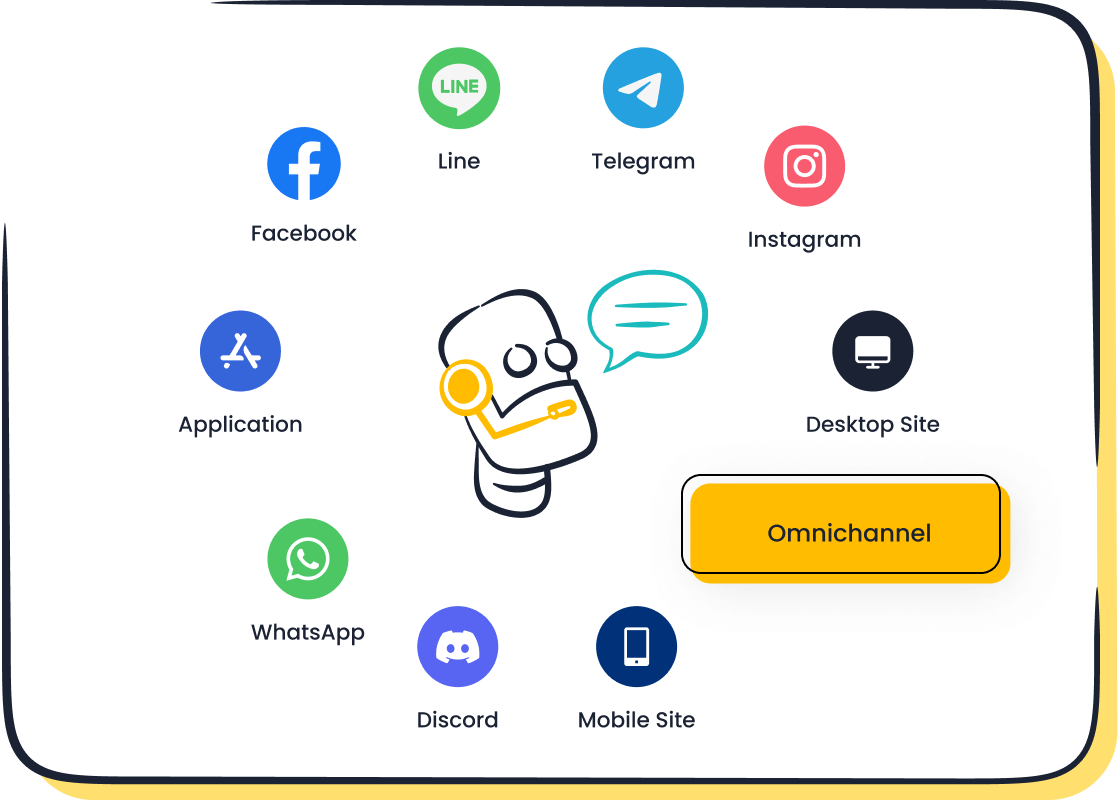
Sobot's AI chatbot exemplifies these benefits. It operates 24/7, autonomously resolving queries and assisting agents, which improves productivity by 70%. Its multilingual capabilities and no-coding-required setup make it a versatile solution for businesses of all sizes.
Common Use Cases Across Industries
Enterprise chatbot solutions are transforming operations across various sectors. Here are some common use cases:
- Retail and E-commerce: Chatbots assist with product recommendations, order tracking, and cart recovery. For instance, Instacart's integration of ChatGPT enhances customer service by providing instant support.
- Healthcare: AI chatbots schedule appointments, collect patient data, and offer mental health support. Northwell Health's pregnancy chatbot is a prime example of innovation in this sector.
- Banking and Finance: Chatbots handle account inquiries, fraud detection, and loan applications. Automation in banking has reached 90%, reflecting the industry's reliance on AI.
- Travel and Hospitality: Chatbots manage bookings, provide travel updates, and offer personalized recommendations, improving customer satisfaction by 75%.
- Education: Platforms like Duolingo use chatbots to simulate conversations, enhancing learning outcomes and user retention.
These examples illustrate the versatility of enterprise chatbot solutions in addressing industry-specific challenges and driving operational efficiency.
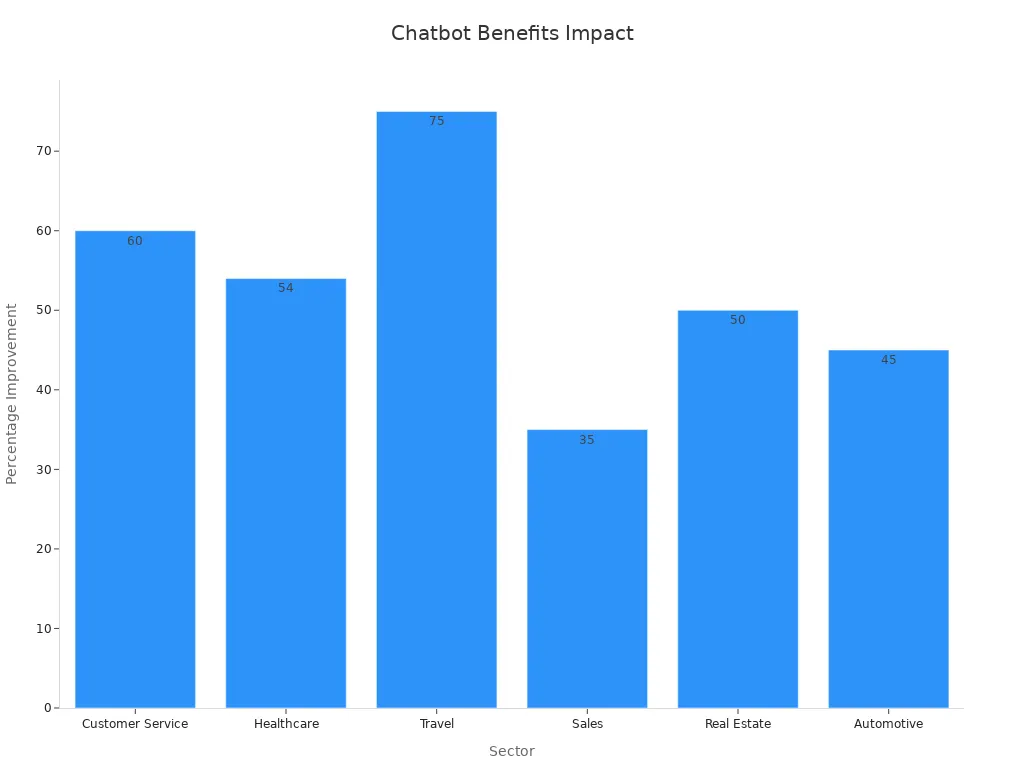
Key Features of Industry-Specific Chatbot Platforms
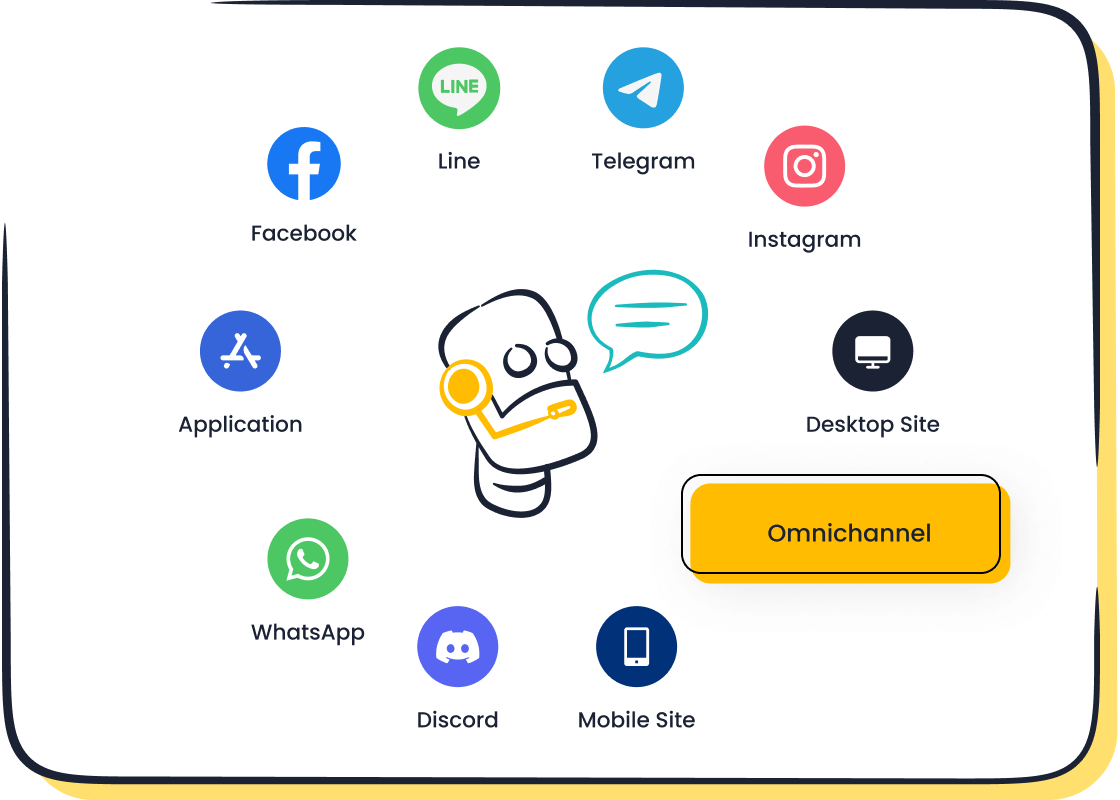
Natural Language Processing (NLP) Capabilities
Natural Language Processing (NLP) is the backbone of modern chatbot platforms. It enables AI chatbots to understand, interpret, and respond to human language with remarkable accuracy. By leveraging NLP, you can ensure that your chatbot delivers contextually relevant and precise answers, enhancing customer experiences. This feature is particularly valuable for industry-specific use cases, where understanding domain-specific terminology is crucial.
For example, conversational AI platforms in the healthcare industry use NLP to interpret medical jargon, enabling intelligent virtual assistants to provide accurate responses to patient inquiries. Similarly, in retail, NLP-powered chatbots analyze customer intent to recommend products or resolve issues instantly. These capabilities not only improve customer engagement but also streamline business operations by reducing the need for human intervention.
Advanced NLP features, such as sentiment analysis and intent recognition, further elevate the performance of AI-powered chatbots. They allow your chatbot to detect customer emotions and adjust responses accordingly, creating a more personalized interaction. This level of sophistication ensures that your enterprise chatbot solution remains a valuable asset for delivering exceptional customer experiences.
Integration with CRM and Other Systems
Seamless integration with various platforms, including CRM systems, is a defining feature of industry-specific chatbot platforms. This capability allows your chatbot to access and utilize customer data effectively, ensuring personalized and efficient interactions. For instance, when integrated with a CRM, the chatbot can retrieve customer purchase history, preferences, and past interactions to provide tailored recommendations or resolve issues faster.
Integration also extends to other essential business tools, such as marketing automation software, ticketing systems, and analytics platforms. This interconnected ecosystem enables your chatbot to function as a central hub for managing customer interactions across multiple channels. For example, platforms like Sobot's AI chatbot offer omnichannel support, allowing you to unify customer engagement across email, social media, and voice channels.
By optimizing API calls and improving error handling, chatbot solutions ensure smooth integration without technical challenges. This not only enhances the chatbot's functionality but also improves overall operational efficiency. Whether you're in retail, finance, or healthcare, integrating your chatbot with existing systems ensures that it aligns seamlessly with your business operations.
Scalability and Deployment Options
Scalability is a critical factor when choosing a chatbot platform, especially for industries with fluctuating demand. A scalable chatbot can handle high volumes of customer interactions without slowdowns or crashes, ensuring uninterrupted service during peak times. For example, AI chatbot solutions designed for e-commerce can manage traffic surges during holiday sales or promotional events.
To achieve scalability, chatbot platforms employ advanced techniques such as auto-scaling, load balancing, and message queues. These features allow your chatbot to adapt dynamically to varying workloads, ensuring consistent performance. Additionally, deployment options like container orchestration enable efficient resource allocation, further enhancing scalability.
Chatbot platforms must also accommodate diverse server environments to meet industry-specific requirements. Whether you prefer on-premise deployment for enhanced security or cloud-based solutions for flexibility, the right platform should align with your operational needs. By implementing caching, database optimization, and better query handling, scalable chatbots deliver faster response times, improving customer satisfaction and operational efficiency.
Customization and Multilingual Support
Customization and multilingual support are essential features that elevate chatbot platforms to meet the unique demands of diverse industries. By tailoring chatbot functionalities to specific business needs, you can ensure seamless customer interactions and enhanced operational efficiency. For instance, platforms like Sobot’s AI chatbot allow businesses to design workflows without coding, making them customizable for specific industries. This flexibility empowers you to adapt the chatbot to your industry-specific use cases, whether it’s retail, healthcare, or finance.
Multilingual support further amplifies the impact of intelligent virtual assistants. Offering assistance in multiple languages not only improves customer experiences but also drives customer engagement. Research shows that 70% of users feel more loyal to brands that provide support in their native language. Additionally, 35% of end users are willing to switch to products that prioritize localization strategies. These statistics highlight the importance of multilingual capabilities in expanding your customer base and reducing churn.
Tip: Implementing multilingual chatbots can significantly boost customer satisfaction (CSAT) scores. Businesses that fail to offer language support risk losing up to 29% of their customers.
Customization and multilingual support also enhance scalability. AI chatbot solutions equipped with these features can handle diverse customer inquiries across global markets, ensuring consistent service delivery. Whether you’re managing product recommendations in retail or addressing medical queries in healthcare, these capabilities make your chatbot a valuable asset for improving customer service automation.
Cost-Effectiveness and ROI
Investing in chatbot platforms delivers measurable cost savings and a high return on investment (ROI). By automating repetitive tasks, chatbots reduce the workload on human agents, allowing them to focus on complex issues. This efficiency translates into significant financial benefits. For example, businesses save an average of $300,000 annually through chatbot implementation. Additionally, AI-driven solutions reduce overall support costs by 30%, making them a cost-effective choice for industries aiming to optimize operations.
The impact of chatbots on ROI extends beyond cost savings. Platforms equipped with advanced conversational AI capabilities drive sales and improve resolution rates. A study revealed that AI-powered chatbots achieve a 90% resolution rate for product queries, enhancing customer satisfaction and loyalty. Furthermore, businesses report a 67% increase in sales through chatbot-driven interactions, showcasing their potential to boost revenue.
| Evidence Type | Statistic/Impact | Source Link |
|---|---|---|
| Reduction in inquiries | 70% reduction in call, live chat, and email inquiries after implementing chatbots | Gartner |
| Resolution rate | 90% resolution rate for product queries using AI-powered chatbot | Healthspan Case Study |
| Increase in sales | 67% increase in sales reported through chatbots | Master of Code |
| Cost savings | Average savings of $300,000 per year from chatbot implementation | Localiq |
| Reduction in support costs | Overall support costs reduced by 30% | Invesp |
| Labour savings | Bots saved businesses approximately 2.5 billion hours of work in 2023 | Localiq |
| Increase in agent productivity | AI bots can increase agent productivity by 50% | ScienceDirect |
AI chatbot solutions also enhance agent productivity by up to 50%, enabling faster response times and improved customer engagement. These platforms streamline business operations, making them indispensable for industries seeking scalable and cost-effective solutions. Whether you’re in retail, finance, or healthcare, leveraging chatbots ensures a strong ROI while delivering exceptional customer experiences.
Chatbot Comparison: Top Platforms for Industry Needs
Sobot Chatbot for Retail and E-commerce
The retail and e-commerce industry thrives on delivering seamless customer experiences. Sobot's AI chatbot stands out as a powerful tool for businesses in this sector. It provides 24/7 support, assisting customers with inquiries, product recommendations, and purchasing decisions. This capability not only enhances user satisfaction but also drives sales growth.
Key performance metrics highlight the chatbot's effectiveness:
- Retention Rate: Sobot's chatbot fosters loyalty by providing consistent and personalized interactions.
- Interactions per User: Customers engage frequently, reflecting the chatbot's ability to address their needs effectively.
- Goal Completion Rate (GCR): The chatbot achieves high success rates in guiding users through tasks like checkout or issue resolution.
- Click-through Rate (CTR): Its proactive messaging and smart self-service features lead to increased conversions.
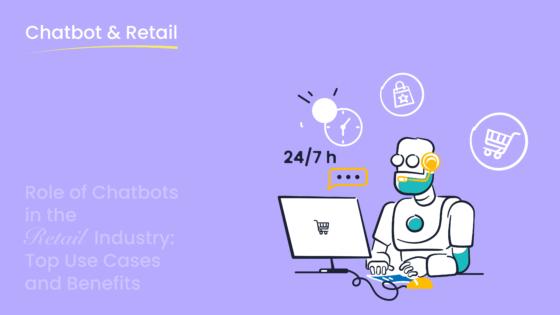
For example, Sobot's omnichannel support ensures customers receive assistance across platforms like WhatsApp, SMS, and social media. This integration streamlines customer interactions, reducing response times and improving operational efficiency. By leveraging intelligent virtual assistants like Sobot's chatbot, you can optimize your e-commerce strategy and achieve measurable results.
Chatbot Solutions for Financial Services
In the financial services industry, chatbots play a critical role in enhancing customer engagement and operational efficiency. Sobot's AI chatbot solutions are tailored to meet the unique demands of this sector, offering features like personalized financial advice, seamless transactions, and robust security.
| Metric | Description |
|---|---|
| 24/7 Availability | Provides constant support, ensuring customer satisfaction and loyalty. |
| Cost Efficiency | Reduces reliance on human agents, leading to significant cost savings. |
| Personalized Customer Experience | Delivers tailored advice, improving engagement and trust. |
| Enhanced Security & Compliance | Tracks transactions and ensures adherence to regulations. |
| Seamless Transactions | Automates processes like fund transfers, ensuring speed and accuracy. |
| Multichannel Support | Offers consistent service across platforms, enhancing user experience. |

For instance, Sobot's chatbot integrates seamlessly with CRM systems, enabling financial institutions to access customer data and provide personalized solutions. Its multilingual capabilities ensure inclusivity, while its compliance with data protection regulations builds trust. By automating routine tasks, Sobot's chatbot allows financial service providers to focus on complex customer needs, driving both efficiency and satisfaction.
Chatbot Platforms for Healthcare
Healthcare organizations increasingly rely on chatbot platforms to improve patient care and streamline operations. Sobot's AI chatbot offers advanced capabilities tailored to this industry, such as appointment scheduling, symptom tracking, and chronic disease management.
Key statistics demonstrate the impact of chatbots in healthcare:
- A study found that Ada's chatbot recognized 99% of conditions in clinical scenarios, showcasing its effectiveness in triage.
- Sensely's chatbot achieved a 94% success rate for daily check-in completion, aiding medication adherence.
- 75% of mental health chatbot interactions occur outside office hours, highlighting their accessibility.

Sobot's chatbot excels in providing multilingual support and 24/7 availability, ensuring patients receive timely assistance. For example, it can guide patients through self-triage, reducing the burden on healthcare staff. Its integration with electronic health records (EHR) systems enables personalized care, while its compliance with data privacy regulations ensures patient trust. By adopting conversational AI platforms like Sobot's, healthcare providers can enhance patient outcomes and operational efficiency.
Conversational AI Platforms for Gaming and Entertainment
The gaming and entertainment industry thrives on creating immersive and interactive experiences. Conversational AI platforms have become indispensable tools for enhancing user engagement and streamlining operations in this dynamic sector. These platforms leverage advanced AI capabilities to deliver personalized interactions, automate routine tasks, and foster community engagement.
Key features of conversational AI platforms in gaming and entertainment include:
- Predictive Analytics for Content Recommendations: These platforms analyze user behavior to suggest games, videos, or events tailored to individual preferences, boosting engagement.
- Enhanced Community Engagement: By facilitating interactive discussions and real-time communication, conversational AI fosters loyalty and builds vibrant user communities.
- Integrated Feedback Management Systems: Platforms collect and analyze user feedback, enabling developers to refine their offerings and improve user satisfaction.
- Automated Content Recommendations: AI chatbots suggest personalized content, increasing user retention and session durations.
- Efficient Event Management and Promotion: These platforms streamline event planning and promotion, ensuring higher participation rates.
For example, streaming platforms track metrics like watch time, completion rates, and session durations to refine their content strategies. A high completion rate often indicates that users find the content engaging and relevant. Similarly, platforms like Sobot's AI chatbot can enhance gaming experiences by providing 24/7 support, answering player queries, and offering personalized recommendations. This not only improves customer interactions but also drives user satisfaction and retention.
Gaming companies also benefit from the scalability of conversational AI platforms. During peak times, such as game launches or live events, these platforms handle high volumes of user interactions without compromising performance. By integrating conversational AI into your gaming or entertainment business, you can create a seamless and engaging experience for your audience.
Chatbot Tools for Travel and Hospitality
The travel and hospitality industry relies heavily on exceptional customer service to build loyalty and drive bookings. Chatbot platforms have revolutionized this sector by automating customer interactions, providing real-time support, and enhancing the overall guest experience.
Key metrics highlight the effectiveness of chatbot tools in this industry:
- Conversation Success Rate: Chatbots achieve a success rate of 70-80% after 1,000 interactions, demonstrating their ability to communicate effectively.
- Booking Conversion Rate: A well-optimized chatbot can achieve a booking conversion rate of 20%, significantly boosting revenue.
- Customer Retention Rate: Personalized interactions and timely support lead to higher retention rates, ensuring repeat bookings and long-term growth.
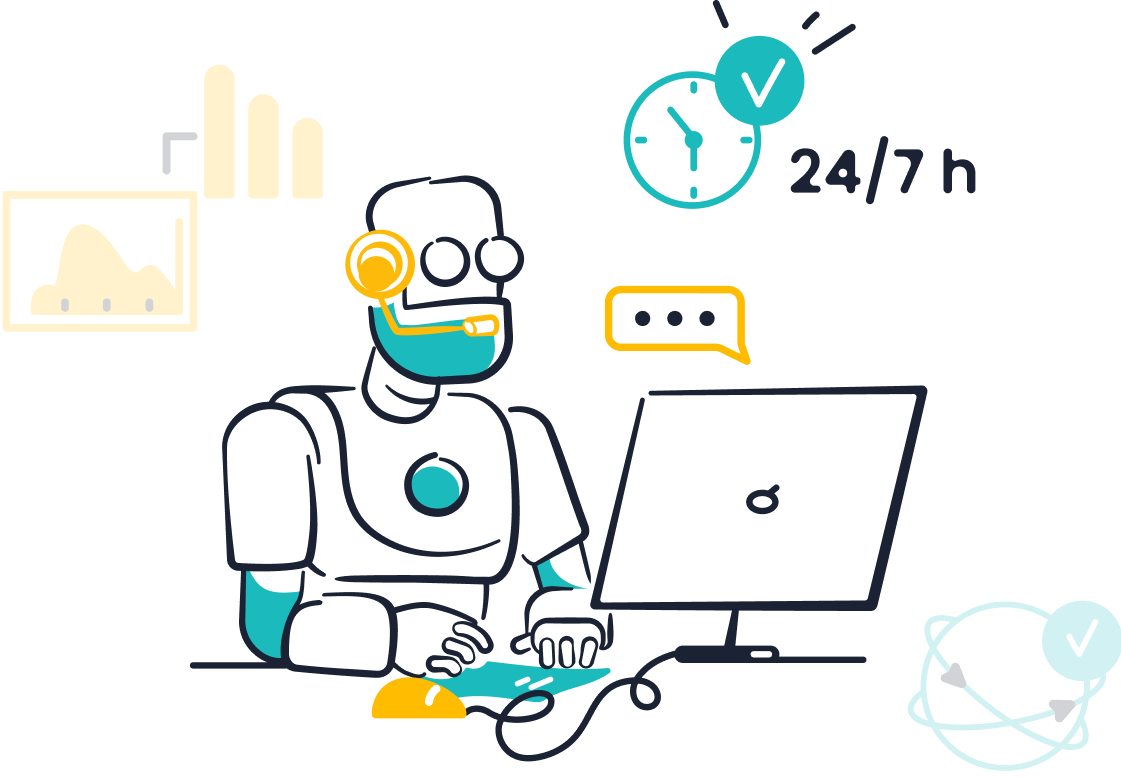
Sobot's AI chatbot offers tailored solutions for the travel and hospitality industry. It provides multilingual support, enabling businesses to cater to a global audience. Its 24/7 availability ensures that customers receive assistance at any time, whether they need help with bookings, itinerary changes, or travel recommendations. By integrating with CRM systems, Sobot's chatbot delivers personalized experiences, enhancing customer engagement and satisfaction.
For instance, timely support through chatbots reduces churn rates and increases customer lifetime value. Travelers appreciate instant responses to their queries, which improves their overall experience. Additionally, chatbots streamline operations by automating routine tasks like booking confirmations and payment processing. This allows your staff to focus on delivering exceptional service, further elevating your brand's reputation.
By adopting chatbot platforms, you can transform your travel or hospitality business into a customer-centric operation. These tools not only improve efficiency but also create memorable experiences that keep customers coming back.
How to Choose the Right Chatbot Platform
Assessing Industry-Specific Requirements
Choosing the right chatbot platform begins with understanding your industry-specific needs. Each industry has unique challenges, and your platform must align with these requirements to deliver optimal results. Start by identifying your business goals. Does the chatbot aim to improve customer engagement, reduce operational costs, or enhance service efficiency? Ensure the platform supports these objectives.
Evaluate critical factors such as security, compliance, and support. For industries like finance or healthcare, robust security features and adherence to regulations are non-negotiable. Additionally, consider the level of technical support and maintenance offered by the vendor. A reliable platform ensures smooth operations and proactive issue resolution.
Tip: Personalization can significantly increase the containment rate of virtual customer support agents, improving customer satisfaction and reducing the need for human intervention.
| Evaluation Criteria | Description |
|---|---|
| Machine Learning Abilities | The capability of the chatbot to understand and process customer inquiries effectively. |
| Containment Rate | The percentage of conversations resolved by the bot without human intervention. |
| Level of Personalization | The ability of the chatbot to provide tailored responses based on user data. |
| Time to Value | The speed at which the chatbot can be implemented and start delivering value. |
| Business Goals Alignment | Ensuring the chatbot supports the company's strategic objectives. |
| Support and Maintenance | Availability of technical support and ongoing maintenance for the chatbot. |
| Security and Compliance | Adherence to security protocols and regulations relevant to the industry. |
| Cost and ROI | Evaluation of the total cost of ownership and potential return on investment. |
| Vendor Reputation | The reliability and trustworthiness of the chatbot provider. |
Evaluating Features and Vendor Expertise
The features of a chatbot platform determine its effectiveness in handling customer interactions. Look for platforms with advanced conversational AI capabilities, such as natural language processing and sentiment analysis. These features ensure the chatbot delivers relevant and helpful responses, enhancing the user experience.
Vendor expertise is equally important. Assess the provider's track record and reputation in delivering enterprise conversational AI solutions. A reliable vendor offers robust support, regular updates, and a clear roadmap for future enhancements.
The analysis framework for chatbot evaluation benchmarks performance by quantifying user experience aspects like response relevance and dialogue helpfulness. This approach ensures a comprehensive assessment of the platform's capabilities.
Comparing different chatbot platforms allows you to identify the one that best meets your needs. Consider both qualitative insights and quantitative metrics, such as fallback rates and user satisfaction scores, to make an informed decision.
Considering Budget and Long-Term ROI
Budget constraints often influence platform selection. However, focusing solely on upfront costs can lead to missed opportunities for long-term gains. Conduct a cost-benefit analysis to evaluate the total cost of ownership and potential ROI. For example, a chatbot with a monthly cost of $1,160 can generate savings of $5,800, resulting in a 400% ROI.
| Item | Value |
|---|---|
| Gains (monthly savings) | $5,800 |
| Chatbot cost | $1,160 |
| ROI calculation | ($5,800 – $1,160) / $1,160 |
| ROI | 400% |
Investing in AI chatbot solutions also reduces the need for extensive agent training and onboarding. Metrics like Customer Satisfaction Score (CSAT) and First Contact Resolution (FCR) highlight the chatbot's impact on customer engagement and operational efficiency. By choosing a scalable and cost-effective platform, you ensure sustainable growth and a strong return on investment.
Importance of Scalability and Security
Scalability and security are two critical pillars for deploying effective chatbot platforms in any industry. As your business grows, the ability of your chatbot to handle increasing volumes of customer interactions without compromising performance becomes essential. A scalable platform ensures consistent service delivery, even during peak periods, such as holiday sales or promotional events. This capability allows you to maintain high levels of customer engagement while meeting operational demands.
Scalability also plays a vital role in industries operating across multiple regions. Chatbots automate repetitive tasks and deliver a uniform user experience, regardless of location. By integrating seamlessly with legacy systems, these platforms enhance existing workflows without requiring significant changes to your technology infrastructure. This adaptability ensures that your enterprise conversational AI solution aligns with your business needs.
Note: A scalable chatbot not only improves efficiency but also ensures consistent quality in service delivery, unaffected by human factors like fatigue or error.
Security is equally important, especially when chatbots handle sensitive personal data. Platforms must adhere to stringent security standards to protect customer information. Features like data encryption, GDPR compliance, and secure backups safeguard against breaches. For example, AI chatbot solutions in financial services rely on robust security measures to build trust and ensure compliance with regulations. Without these safeguards, your chatbot could expose your business to significant risks.
When choosing a platform, prioritize those with proven scalability and built-in security features. These attributes ensure your chatbot can grow with your business while protecting customer data. By addressing these critical factors, you can deploy a solution that enhances customer engagement and operational efficiency.
Future Trends in Conversational AI Platforms
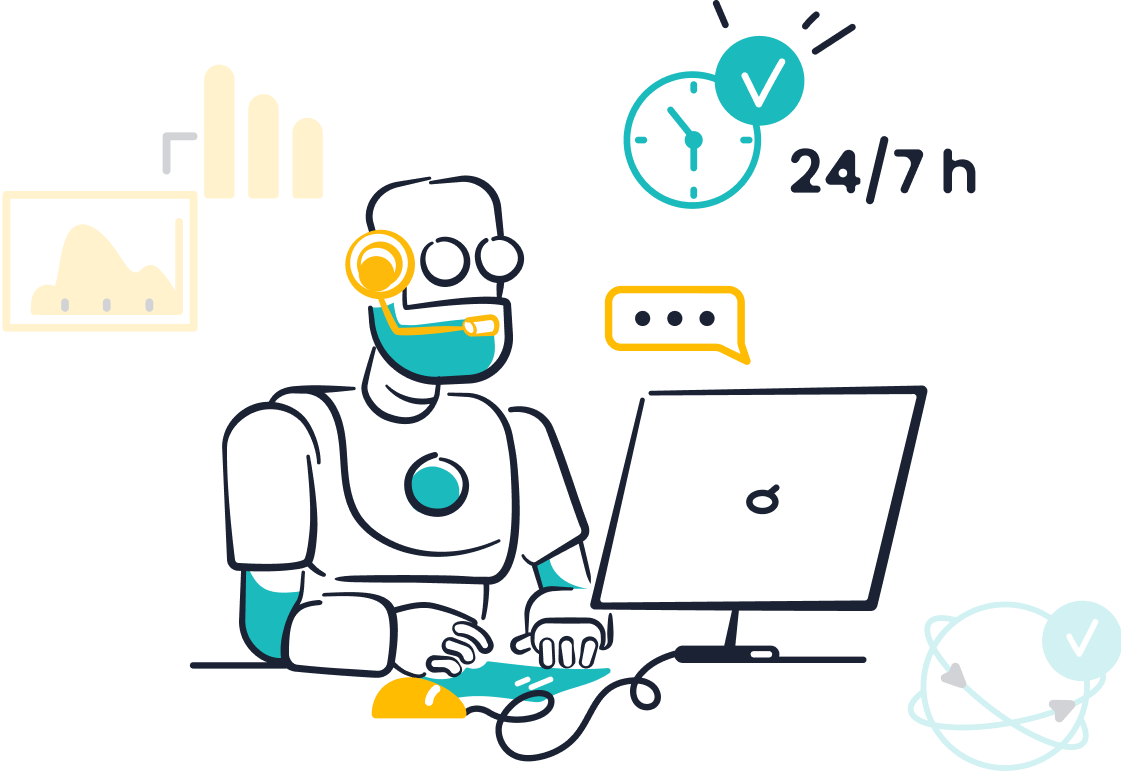
AI and Machine Learning Innovations
AI and machine learning continue to revolutionize chatbot platforms, driving innovation at an unprecedented pace. These technologies enable chatbots to learn from interactions, improving their ability to understand and respond to complex queries. By 2030, the conversational AI market is projected to reach $32 billion, with a yearly growth rate of 19% since 2021. This rapid expansion highlights the increasing reliance on AI chatbot solutions across industries.
The financial impact of these advancements is equally significant. By 2025, AI is expected to reduce client service costs by $11 billion, while contact center agent labor costs could drop by $80 billion by 2026. Additionally, the post-pandemic surge in handled interactions has increased by 250%, showcasing the scalability of enterprise conversational AI. These trends underline the importance of adopting AI-driven platforms to enhance customer engagement and operational efficiency.
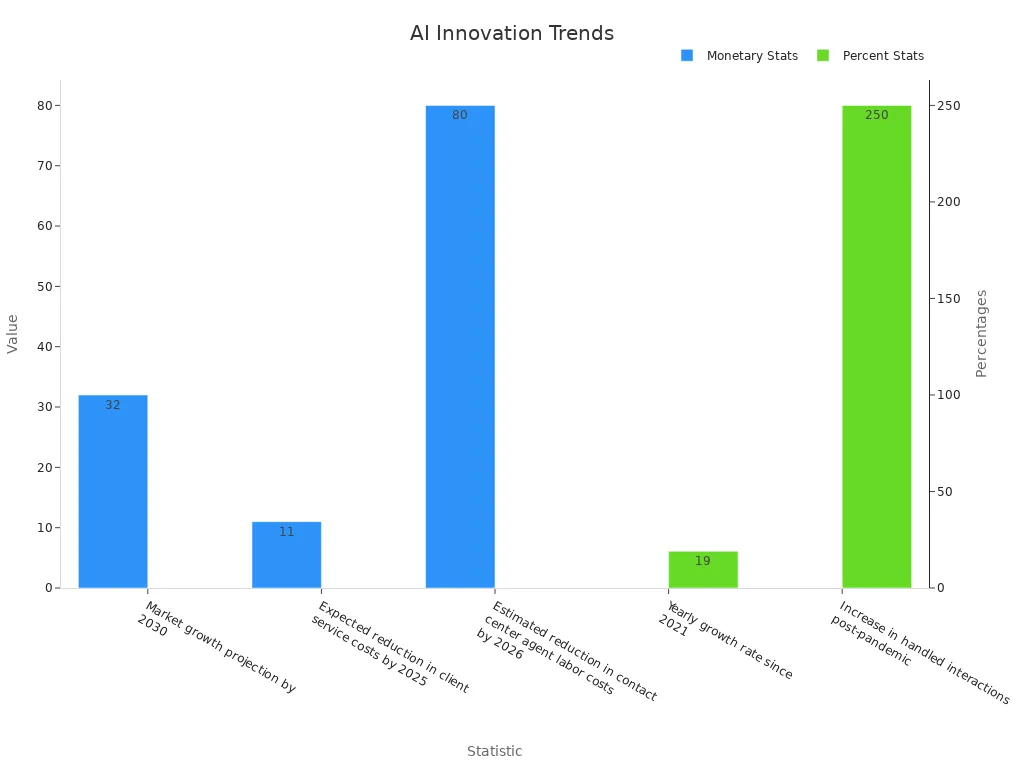
Businesses must also consider customer expectations. Over 73% of clients believe AI will improve care quality, while 75% expect AI to match human-level assistance. These insights emphasize the need for chatbot platforms to deliver human-like interactions, ensuring a seamless user experience.
Enhanced Personalization and Customer Insights
Personalization has become a cornerstone of modern chatbot platforms. By leveraging analytics, you can understand user behavior and preferences, enabling chatbots to create tailored interactions. This approach not only enhances user satisfaction but also increases conversion rates. Tracking user interactions and conversation flows allows chatbots to adapt in real time, improving customer journeys and fostering loyalty.
The shift toward personalized experiences is evident. By 2025, conversational AI is expected to move away from generic responses, focusing instead on tailored user experiences. This evolution highlights the growing importance of customer insights in shaping chatbot functionalities. Platforms that prioritize personalization will stand out, offering a competitive edge in customer engagement.
Expansion of Multilingual and Omnichannel Capabilities
The global nature of business demands chatbot platforms with robust multilingual and omnichannel capabilities. Multilingual chatbots break language barriers, enabling businesses to serve diverse customer bases effectively. They also enhance marketing efforts, allowing you to tap into new markets and expand your reach.
Omnichannel capabilities further elevate customer interactions. By integrating AI and natural language processing, chatbots can provide consistent support across platforms like email, social media, and voice channels. This seamless interaction ensures a unified customer experience, regardless of the communication medium.
The adoption of these features is accelerating. Businesses increasingly rely on multilingual chatbots to engage broader audiences, while omnichannel capabilities address the need for cohesive customer interactions. These advancements position chatbot platforms as essential tools for modern enterprises, driving both efficiency and customer satisfaction.
Focus on Data Privacy and Compliance
Data privacy and compliance have become critical considerations for chatbot platforms, especially as industries increasingly rely on conversational AI platforms to manage customer interactions. Protecting sensitive information is not just a regulatory requirement but also a cornerstone of building trust with your customers.
Chatbot platforms must adhere to stringent data protection standards to ensure compliance with industry regulations. For example, financial institutions face significant risks when chatbots fail to safeguard customer data or provide inaccurate information. These failures can lead to noncompliance with federal consumer financial laws, exposing businesses to legal and reputational damage. Additionally, consumer complaints about data breaches highlight the importance of robust security measures in AI chatbot solutions.
To address these challenges, modern platforms incorporate advanced security features. Data encryption, GDPR compliance, and secure backups are now standard in enterprise conversational AI solutions. These measures protect customer data from unauthorized access and ensure that your chatbot aligns with global privacy regulations. For instance, AI chatbots in the finance sector use these features to track transactions securely while maintaining compliance with legal standards.
You should also prioritize transparency in your chatbot's operations. Informing users about data collection practices and obtaining explicit consent fosters trust and enhances customer engagement. Multichannel support further strengthens compliance by providing consistent security across all communication platforms.
The growing focus on data privacy reflects the evolving expectations of both consumers and regulators. By choosing chatbot platforms with robust compliance features, you can safeguard sensitive information, meet regulatory requirements, and maintain customer trust. This approach not only protects your business but also positions your platform as a reliable tool for managing secure customer interactions.
Selecting the right ai chatbot platform is crucial for addressing industry-specific challenges and achieving operational excellence. Enterprise chatbots streamline processes, enhance customer engagement, and deliver measurable results. For instance, customer support chatbots operating 24/7 ensure uninterrupted service, while their multilingual capabilities expand global reach.
Key performance metrics highlight the value of popular ai chatbot solutions:
| Metric | Description |
|---|---|
| Engagement Rates | Reflects how effectively the chatbot interacts with users. |
| Conversion Rates | Measures the percentage of users completing desired actions post-interaction. |
| User Satisfaction Scores | Gauges the chatbot's helpfulness through user feedback. |
| Cost Metrics | Evaluates financial benefits, including savings from automation. |
Sobot Chatbot exemplifies these advantages. Its AI-powered features improve efficiency, accuracy, and customer satisfaction. By leveraging Sobot’s solutions, you can optimize operations and achieve higher ROI. Explore Sobot and other popular ai chatbot solutions to transform your customer interactions today.
FAQ
What industries benefit the most from chatbot platforms?
Chatbot platforms provide value across industries like retail, healthcare, finance, travel, and gaming. They automate repetitive tasks, improve customer engagement, and reduce costs. For example, retail businesses use chatbots for product recommendations, while healthcare providers rely on them for appointment scheduling and patient support.
How do chatbots improve customer satisfaction?
Chatbots enhance satisfaction by offering 24/7 support, personalized responses, and instant query resolution. They reduce wait times and provide accurate information, ensuring a seamless customer experience. For instance, multilingual chatbots help businesses cater to diverse audiences, boosting loyalty and engagement.
Are chatbot platforms secure for handling sensitive data?
Yes, most enterprise chatbot platforms prioritize security. They include features like data encryption, GDPR compliance, and secure backups. These measures protect sensitive information, making chatbots suitable for industries like finance and healthcare, where data privacy is critical.
Can chatbots integrate with existing business systems?
Modern chatbot platforms integrate seamlessly with tools like CRM, ticketing systems, and marketing software. This integration allows you to access customer data, automate workflows, and deliver personalized interactions. For example, Sobot's chatbot connects with multiple systems to unify customer engagement across channels.
Do chatbots require coding knowledge to set up?
No, many chatbot platforms, including Sobot, offer no-code or low-code interfaces. You can design workflows using drag-and-drop tools or point-and-click setups. This feature makes chatbot deployment accessible to businesses without technical expertise, saving time and resources.
See Also
Essential Tips for Selecting Top Chatbot Solutions
Best 10 Chatbot Options for Websites This Year
Easy Steps to Integrate Chatbot Examples on Websites